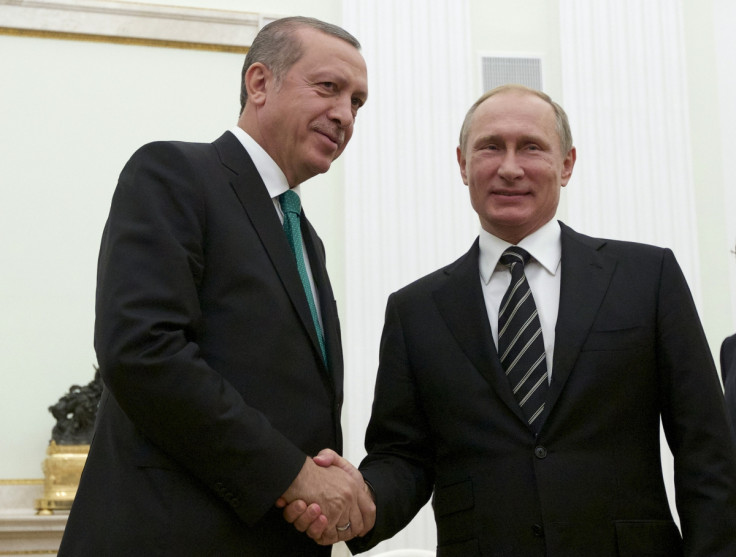Syria crisis: Turkey and Russia wage war of words over shooting down of Su-24 jet but neither wants a fight

The war of words over Turkey's shooting down of a Russian Su-24 jet over northern Syria continued on 25 November, with Russian President Vladimir Putin echoing Foreign Minister Sergei Lavrov in urging Russians not to visit the country and branding the attack a stab in the back.
Turkey's confused and at times abrasive policy towards Syria has come under scrutiny as Russia has accused it of directly aiding Islamic State (Isis), a claim that is not entirely unwarranted. Ankara has previously appeared indifferent over the flow of foreign fighters from Turkey to Syria and the smuggling of oil and antiquities in return. It has also bombed one of the few groups mounting a credible fight against IS in northern Syria, the Kurds.
But strong statements by Putin and Prime Minister Dmitry Medvedev do not mean that the first downing of a Russia plane by a NATO member since 1953 means that the world is any closer to a third world war, as is being claimed on social media and by more hysterical pundits and commentators. Putin still has to sell his war at home, and coming out fighting is the only way that he can satisfy Russians that Turkey's actions will have consequences.
But what are those consequences likely to be? If Russians heed their leader's call to shun Turkish holiday resorts, the effect on Turkey's tourist industry should not be underplayed. Turkey's seaside resorts are popular destinations for Russians, who are the second largest group of tourists in Turkey after Germans. The attack in Sinai undoubtedly put Russians off travelling to Egypt, and Lavrov said on Tuesday that Turkey was no less of a terrorist threat. Reuters reported that around 3.3m Russian tourists visited Turkey in 2014.
Turkey has extensive trade links with Russia, and is the second biggest buyer of Russian natural gas and fourth largest buyer of oil. The two countries have previously collaborated on a gas pipeline project, TurkStream, which will allow Russia to bypass Ukraine when exporting gas to the West. Meanwhile, Turkey recently commissioned Russia's state-owned Rosatom to build four reactors as part of a $20bn project, Reuters reported.
Turkey and Russia have been on the opposite side of the war in Syria since it began, with Ankara an early opponent of President Bashar al-Assad and a supporter first of the Free Syrian Army and then later Islamist militias. Russia has always stood behind its long-term ally Assad and, since entering the war formally earlier this year, has been actively bombing both Isis and militias supported by Turkey.
But at the same time, relations between the two countries have been relatively cordial. Lavrov was due to visit Turkey on Wednesday – he later cancelled the trip – and just one month ago, Russian state-owned media was lauding ties between the two countries, quoting Russian Deputy Foreign Minister Alexei Meshkov as saying that trade could reach $100bn, up from $30bn at the end of 2014.
This target was also cited by Turkish President Recep Tayyip Erdogan on a visit to Moscow in December 2014, during which Putin and Erdogan were pictured smiling in hard-hats. The two leaders lit a symbolic torch at the site of the TurkStream project. In reality, the status of the projects is likely to be unaffected by the recent spat over Syria, although both sides will likely refrain from discussing them openly in the coming weeks.
As for the political backlash, both Erdogan and Putin have made the right aggressive noises but neither of them wants to fight. The UN, EU and NATO have appealed for calm and in the days ahead it is likely that all sides will want the issue to drop from the news agendas, particularly as the second pilot from the Russian jet that was shot down has reportedly been found alive.
As commentators have noted, the likelihood is that the incident will be put down to the fog of war, with Russia and Turkey both wanting to retreat with their pride intact. NATO has no desire to engage in all-out war with Russia even if, ironically, that is exactly what it could be doing when the international campaign in Syria ramps up following the Paris attacks. Syria, the real victim in all this, looks no closer to resolution or peace.
© Copyright IBTimes 2025. All rights reserved.






















